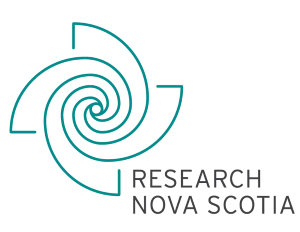Nova Scotia launches program to fund interdisciplinary research driven by societal outcomes
 Nova Scotia’s research funding agency has launched a new approach to support research, the first of its kind in Canada driven by achieving specific societal outcomes for residents in the province.
Nova Scotia’s research funding agency has launched a new approach to support research, the first of its kind in Canada driven by achieving specific societal outcomes for residents in the province.
Research Nova Scotia’s new Focused Research Investments (FRI) initiative will support two to three interdisciplinary research teams with $5 million to $20 million for five to seven years – a substantial amount of research funding for the province.
 “This is a new vehicle to support highly focused, collaborative and determined efforts across disciplines to work on the salient Nova Scotia issues of our time, and achieve specific societal outcomes,” Stefan Leslie (photo at right), CEO of Research Nova Scotia, told Research Money.
“This is a new vehicle to support highly focused, collaborative and determined efforts across disciplines to work on the salient Nova Scotia issues of our time, and achieve specific societal outcomes,” Stefan Leslie (photo at right), CEO of Research Nova Scotia, told Research Money.
Each FRI project will tackle a portfolio of research work and collaborate closely with partners, end-users and/or communities to ensure the work remains focused on its intended impact, he said.
The new approach aims to fill a gap in and also complement the existing research support system provincially, but also at the national level and funding from the three federal Tri-agencies, Canada Foundation for Innovation, Canada Research Chairs and other programs, Leslie said.
“This is not an argument to replace the [research support system] we have. It is acknowledging that the system is incomplete,” he said.
Leslie noted that the FRI initiative also addresses an observation made in the Report of the Advisory Panel on the Federal Research Support System (the “Bouchard report”): “The greatest gaps of the current [federal research support] system is the ability to respond quickly and in novel ways to emerging societal and economic need.”
Research Nova Scotia’s legislated mandate is to support research that produces opportunities and outcomes to advance the province’s key strategic priorities, Leslie said.
“We’ve really taken that idea, of research not just in areas that we know are important, but research that is selected deliberately to advance outcomes which matter to society – and so are defined outside of the research system.”
A main gap in the existing research support systems is that research projects don’t design the societal outcome right at the start of the proposed research project, especially in a way that creates the greatest likelihood of achieving that outcome, Leslie said.
For example, fundamental, or basic, research is aimed at testing a hypothesis and is often driven by a researcher’s curiosity. Applied research, including profit-driven industrial research, is typically done to commercialize and produce a product or novel innovation.
With the FRI program, “We really want to hone in on those matters where research is a critical element to achieving that outcome, rather than one of those other areas,” Leslie said. Any research proposal under FRI must define clear pathways to societal impact.
FRI research proposals also must target societal outcomes where research is an essential component, rather than those components being driven by other elements, such as funding support or policy development.
“We want to forge a way of working. And part of the way of working that we’re looking to create is this idea that what matters most is achieving that outcome,” Leslie said.
However, he noted that the FRI is open to both fundamental and applied research from all disciplines, because understanding the underlying cause of a fundamental phenomenon may be a critical component to the outcomes-driven research project.
“But the objective is to solve, not [just] to learn,” Leslie said. “You solve by learning. But the objective is to fix something” in a way that benefits society.
As an example, he pointed to a project funded – previously to FRI’s launch – by Research Nova Scotia that involves researchers working with a company that supplies ultraviolet lighting to determine whether exposing residents in a long-term care facility to UV light will prevent infections.
The driver for the project is not answering a fundamental research question or producing a product or novel innovation or earning a profit for a company, he explained. The key driver is the societal outcome – the benefit to the long-care residents if the UV light prevents infections.
FRI “is about producing an immediate [societal] value motive,” Leslie said. “We’re taking our leads from society, we’re listening to their needs, we’re attending to what they want.”
Participation in research projects by end-users of the research is essential
The FRI program is a bit of an experiment, including the substantial amount of funding provided to research teams, Leslie said. “At the provincial level, we are putting a lot of chips onto this square.” Also, the FRI investment doesn’t include a requirement for matching funding.
In addition to significant funding, FRI will allow each research team to decide how the money should be spent to achieve the project’s societal outcome, whether it’s for equipment, infrastructure, personnel, operating costs or some other expense that’s crucial to achieving the outcome.
Research Nova Scotia’s four key missions are: the sustainable bioeconomy; climate change adaptation and resilience; healthy people and healthcare systems; and improved quality of life for Nova Scotians.
But proposed FRI research projects also will need to include and involve the end-user groups expected to benefit from the research right from the start, including in the design of the research project and modifications as required along the pathway to achieving the societal outcome.
FRI’s approach takes as a given that there are participants in the research ecosystem that go beyond the post-secondary institutions and research hospitals, Leslie said. “This [research funding] ought to be open to them.”
“Part of what we’re trying to achieve here is to have those that are outside the research system just as excited about the results of the research as those inside the system. That means attending to the salient issues that they face.”
The idea of FRI is to mobilize the “public research agenda, which is to say that there are outcomes that are really important to society that have value in solving,” Leslie said. “It’s research in service to society.”
“What this is about is looking into the future, which may not be very distant. We know we need to begin to assemble better knowledge in these areas so that we are better suited to answer questions that we probably have now, but we know are only going to get more urgent or more important in years to come.”
FRI doesn’t involve “picking winners”
Government is often warned against “picking winners” when it comes to research and innovation funding support.
However, Leslie stressed that the FRI program doesn’t involve picking specific technologies, sectors or institutions. The program doesn’t involve picking winners, he said, but “[picking] the willing who want to achieve the societal outcome.”
“I don’t think the picking winners accusation can really be legitimately applied if society is stipulating that it wants to see that return [on investment in research] in a concrete way.”
The FRI program includes an advisory panel and also will utilize experts in their respective fields to assess the scientific merit and quality of submitted research proposals.
FRI has specific ingredients for considering research proposals:
- Specified outcome: there is or are specified outcome(s) from the research efforts, where clear pathways to societal impact can be defined.
- Research-driven: it is research that can contribute meaningfully to the solution (i.e. not a policy, evaluation or resourcing issue).
- Coordination: the proposed program of work benefits from significant coordination and integration across groups, disciplines or sectors to ensure ongoing feedback and salience of the research.
- Broad societal value: the research will be applicable in different ways and for different end user groups. This is neither a commercial opportunity for proprietary R&D nor an evidence-gathering activity to develop a specific policy or support an advocacy position.
- Fit for purpose: the issue is relevant and urgent for Nova Scotia, and appropriate for the FRI approach.
The FRI initiative also adopts as a premise that small labs can be disproportionately effective in a supportive, collaborative environment focused on a small number of challenging, shared goals.
FRI will support research teams driven to be civic actors and participants, devoting their expertise in service of their communities, Leslie said. “Research supported by the public should benefit the public, whether through immediate solutions to urgent challenges, or paving the way for better decisions and readiness to take on emerging challenges in the future.”
“The FRI initiative is a rare opportunity for researchers to invest in their communities and create a future with genuine impact,” said Melissa Flagg, former deputy assistant to the U.S. secretary of defense for research and member of the advisory panel for FRI.
“It’s more than a project; it’s a commitment to building a thriving Nova Scotia that draws in those hungry for purpose and connection,” Flagg said. “I think this is a unique chance for individuals to contribute to a meaningful and tangible future.”
Note: Expressions of Interest to FRI are open to April 29 at 1 p.m. Click here for a video with Stefan Leslie and Melissa Flagg talking about the FRI initiative.
R$
Events For Leaders in
Science, Tech, Innovation, and Policy
Discuss and learn from those in the know at our virtual and in-person events.
See Upcoming Events
You have 0 free articles remaining.
Don't miss out - start your free trial today.
Start your FREE trial Already a member? Log in
By using this website, you agree to our use of cookies. We use cookies to provide you with a great experience and to help our website run effectively in accordance with our Privacy Policy and Terms of Service.




